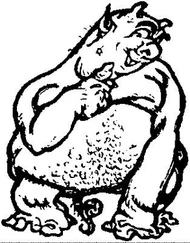Lydia Yavorskaya was cast up on our shores. [16] Lydia Yavorskaya (1871–1921) was a well-known actress.
She arrived unexpectedly, as elegant as ever, and talked about how we must all join forces and organize something. Just what, I never understood. She was accompanied by some kind of boy scout in shorts, whom she referred to rather solemnly as “M’sieur Sobolev.” The block of ice spun around, and they floated away into the mist.
Mironova made a no less sudden appearance. She performed a few pieces at a little theater on the outskirts of town and disappeared too.
Then a woman I liked very much, an actress from some provincial town, floated into our circle. Someone stole her diamonds, and she turned for help to a criminal investigations commissar. This commissar turned out to be someone kind and good-natured. He did what he could to help and then, learning that she would be spending the evening with a group of writers, asked her to take him along with her. He adored literature but had never set eyes on a living writer; nothing could make him happier than to glimpse us in the flesh. The actress asked our permission, then brought him along. Never in my life have I seen someone so tall. His voice was like a great bell high above us, but the words this bell sounded were surprisingly sentimental: well-known children’s verses, and declarations that until this moment his life had been only a matter of mind—or “moind,” as he put it—but that now his heart had awoken.
He spent day after day pursuing criminals and bandits. He’d set up what he called a museum of crime, and he showed us his collection of complex instruments for sawing through locks, snapping off door chains, and slicing silently through iron bolts. He showed us the small tool kits with which a professional burglar goes out to work. Each little case contained a small flashlight, along with a bite to eat and a small bottle of eau de cologne. I was surprised by the eau de cologne.
“Who’d have thought it? Such refinement. What makes them want to douse themselves with eau de cologne when they’re in such danger, when every moment is precious?”
His explanation was simple enough. The eau-de-cologne was a substitute for vodka, which was no longer obtainable.
After catching a few of his bandits, the commissar would join our little circle in the evening. He would show deep feelings; he would express astonishment that we really were the people we said we were. And at the end of the evening he would walk me home. There was something rather frightening about walking at night, down the bleak streets, beside this extraordinarily tall figure. All around us were alarming rustles, stealthy footsteps, screams, sometimes shots. Yet none of these was as frightening as the giant who was my guard.
Sometimes the telephone would ring late in the evening. It was our guardian angel whose heart had awoken. He was phoning to check that everything was all right with us.
After we’d recovered from the shock of the sudden ringing, we would recite:
Nightmare demons
stalk the sinful;
guardian angels
talk to children. [17] From “The Tryst” (1841) by Mikhail Lermontov.
Our guardian angel kept an eye on us until the very moment of our departure. He took us to the railway station and guarded our luggage, which was clearly an object of interest to the Cheka officers there.
•
All of us who were leaving felt a great deal of sorrow. There was a sorrow we all shared, and then we each had our own individual sorrow. Sorrow lay somewhere behind our eyes, deep behind our pupils. There it glimmered—like the skull and crossbones on the forage caps of the Prussian Death’s Head Hussars. But this was not something we spoke about.
I remember the delicate profile of a young harpist. About three months after we left, she was betrayed and executed. I remember my distress over my young friend Leonid Kannegisser. A few days before the assassination of Uritsky, [18] After the October Revolution, Moisey Uritsky (1873–1918) was appointed head of the Petrograd Cheka (i.e. security police). On 17 August 1918 he was assassinated by Leonid Kannegisser, a poet and former military cadet. Soon after this, and after an attempt on Lenin’s life, the Bolsheviks initiated the wave of arrests and executions known as the Red Terror. Kannegisser was executed in October 1918. Ironically, Uritsky had been one of the few important Bolsheviks to disagree with Lenin about the need to resort to terror. See Ivan Bunin, Cursed Days , ed. Thomas Gaiton Marullo (Phoenix Press, 2000), p. 216, note 9.
he’d heard that I was in Petersburg. He telephoned me and said that he very much wanted to see me—but only on neutral territory.
“Why not in my apartment?”
“I’ll explain when we meet.”
We agreed to meet for a meal at the home of some mutual friends.
When we met, Kannegisser said, “People are following me. I don’t want to lead them to your apartment.”
I put this down to adolescent posturing. It was a time when many young people were assuming mysterious airs and pronouncing enigmatic phrases. I thanked him and inquired no further.
He was very melancholy that evening, rather silent.
We recall all too often how, when we last saw some friend of ours, they had sad eyes and pale lips. And we always know, once it is too late, what we ought to have done back then, how we should have taken our friend by the hand and led them away from the shadow of darkness. But there is a mysterious law that does not allow us to disrupt the appointed order, the decreed rhythm. And this is in no way mere egotism or indifference—sometimes it would be easier to stop than to walk on by. The author of The Life of Leonid Kannegisser required us to walk on by, not to disrupt the decreed rhythm of his tragic novel. As if in a dream: You can see everything, you can feel everything, you almost know everything, but you’re unable to stop. You’re compelled to walk on.
Yes, we writers—in the words of a contemporary French colleague—are “imitators of God,” imitators of his creative work. We create worlds and people and we determine their fates, often cruel and unjust. Why we act one way and not some other way, we don’t know. We simply have no choice.
I remember a young actress approaching me during a rehearsal of one of my plays and saying timidly, “May I ask you something? You won’t get angry?”
“You may. I won’t get angry.”
“Why did that poor boy in your play have to be fired? Why do you have to be so cruel? Couldn’t you at least have found him some other job? And then in another play there’s a poor traveling salesman who ends up with egg on his face. Why ? It’s horrible for the poor man. Surely there’s some way you can put these things right?”
“I don’t know… I can’t… It isn’t me who decides.”
But her lips were trembling, and she was pleading so pitifully and so touchingly that I promised to write a separate fairy tale in which I would bring together all those I had injured in my plays and stories and somehow compensate them for their suffering.
“Wonderful!” said the actress. “That will be paradise!”
And she kissed me.
“But there’s a problem,” I interrupted. “I’m afraid that this little paradise of ours won’t really comfort anyone at all. No one will believe us. They’ll know we’ve just made it up.” [19] This conversation is condensed from “Repentant Fate,” first published in 1913 and included in the collection Smoke without Fire (1914). In the story the actress assures Teffi that she would gladly help Teffi’s unfortunate protagonist by giving him money of her own, if only she could. Teffi returns to this theme—the artist as an “imitator of God”—in the last pages of Memories .
Читать дальше












